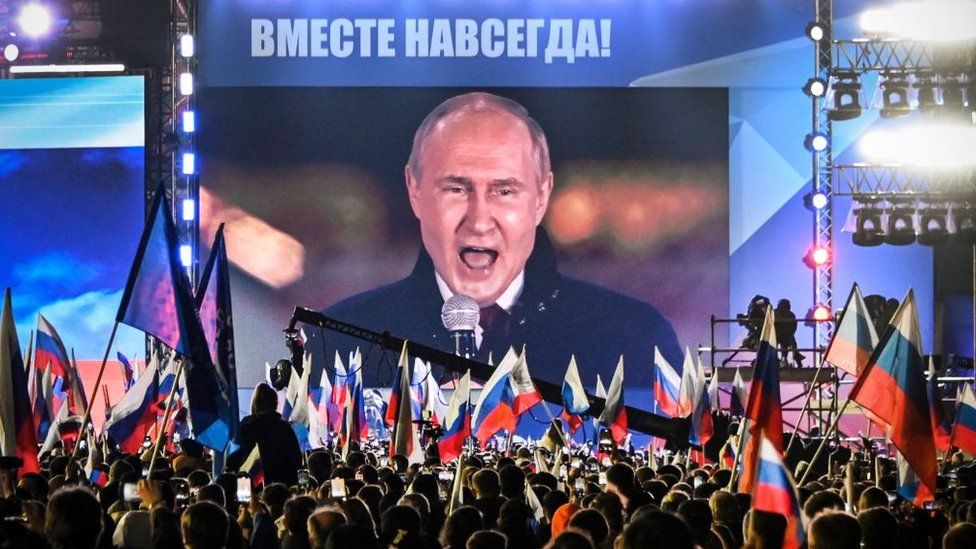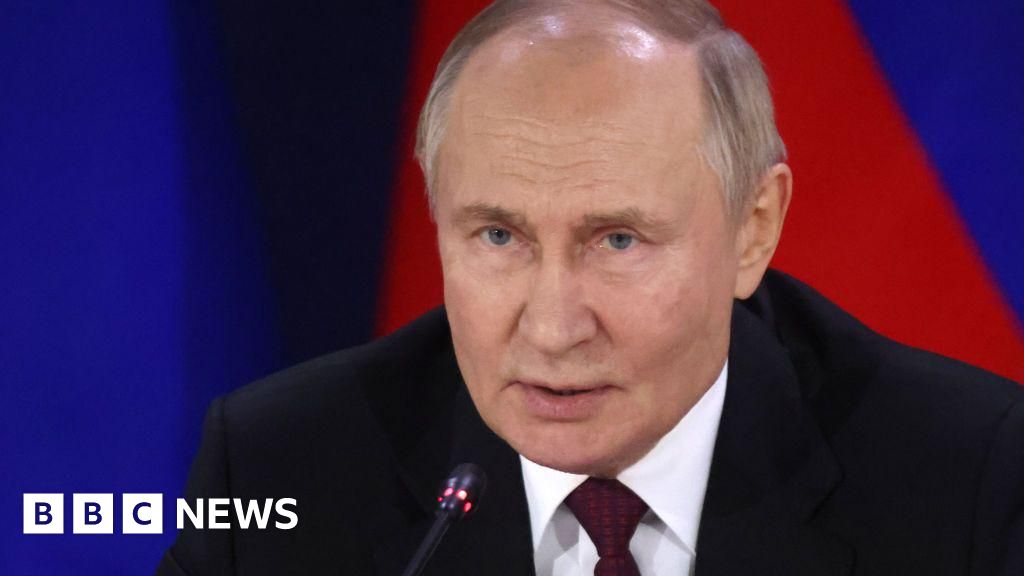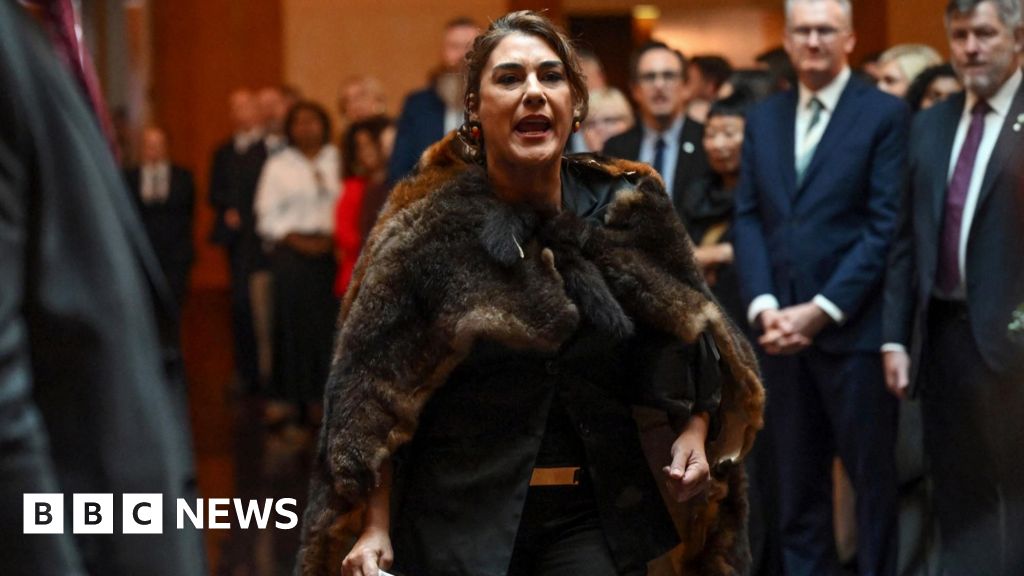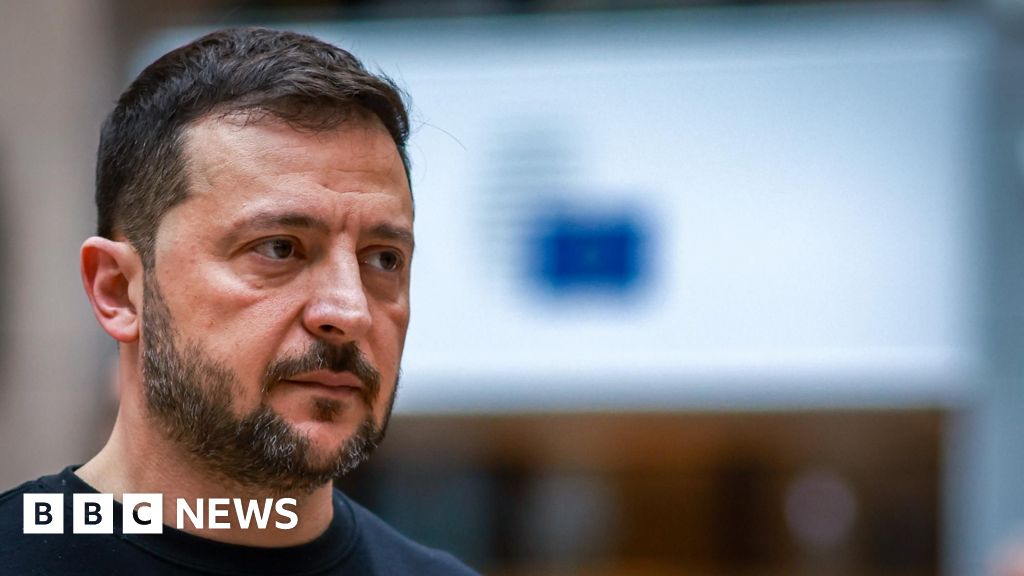ARTICLE AD BOX
 Image source, Getty Images
Image source, Getty Images
Vladimir Putin celebrated his declared annexation of occupied Ukrainian regions in September
By Steve Rosenberg
Russia Editor, Moscow
How the message has changed.
Right after Russia invaded Ukraine, TV talk show hosts here were confidently predicting that within days Russian troops would be marching through Kyiv.
That was nearly nine months ago.
This week the same presenters were grim faced as they announced the army's "difficult decision" to withdraw Russian forces from Kherson - the only Ukrainian regional capital Russia had managed to capture and occupy since invading Ukraine on 24 February. Just six weeks ago, President Putin had claimed to have annexed Kherson region, along with three other Ukrainian territories, insisting that they would be part of Russia forever.
"I wanted our flag to be flying in Kyiv in March," anchor man Vladimir Solovyov told viewers of his show Evening with Solovyov. "It was painful when our troops turned away from Kyiv and Chernihiv. But such are the laws of war…we are fighting Nato."
That's exactly how the Kremlin is trying to spin this: by blaming the West. The message from the Russian state media is that, in Ukraine, Russia is taking on the combined might of America, Britain, the EU and Nato. You name it, Russia's fighting it. In other words, setbacks on the battlefield are not the Kremlin's fault, but the handiwork of external enemies.
There's another message, too: don't criticise the Russian army or Russia's president for what's gone wrong in Ukraine. Instead, do your duty and rally round the flag.
It's advice which, for now, prominent and powerful Russian voices seem to be following. The Chechen leader Ramzan Kadyrov and Yevgeny Prigozhin, the founder of mercenary group Wagner, have been vocal critics of Russia's military leadership. But on the withdrawal from Kherson, both have posted messages of support for the Russian Commander in Ukraine, General Surovikin, who had recommended the pull-back.
The same cannot be said of pro-war Russian military bloggers. They've been busy writing angry messages about the retreat, such as:
"I will never forget this murder of Russia hopes. This betrayal will be carved on my heart for centuries." ['Zastavny']
"This is a massive geopolitical defeat for Putin and Russia…the defence ministry lost the trust of society long ago…now trust in the president will disappear." [ 'Zloi Zhurnalist']
Not if the Kremlin can help it. It's been trying hard to distance President Putin from the retreat, knowing that many here in Russia will view the withdrawal as a military setback and a blow to Russian prestige. Earlier this week it was the generals who made the announcement that Russian forces would be withdrawn from part of Kherson region. Russian TV showed Defence Minister Sergei Shoigu issuing the order, following consultations with General Surovikin. Vladimir Putin, the Commander in Chief, was nowhere to be seen.
Image source, Russian Defence Ministry
Image caption,Gen Surovikin (L) said the withdrawal, ordered by the defence minister (R) was a difficult decision
"The Defence Minister took the decision, I have nothing to say about this," President Putin's spokesman Dmitry Peskov told journalists on Friday. The Kremlin is letting the military own this one. Or, at least, trying to.
But it was President Putin who ordered the invasion of Ukraine. What he calls the 'special military operation' was his idea. Distancing himself from any aspect of it won't be easy.
There is a danger here for Vladimir Putin, but one that pre-dates the retreat from Kherson. Events of the last nine months risk changing how the president is perceived here at home: not so much by the Russian public, but - crucially - by the Russian elite, by the people around him, by the people in power.
For years they have viewed Mr Putin as a master strategist, as someone who always manages to come out on top… as a winner. They have looked on him as the lynchpin of the system of which they are part and which has been built around him.
"Winning", though, has been in short supply since 24 February. Vladimir Putin's invasion has not gone according to plan. Not only has it resulted in death and destruction in Ukraine, but significant military losses for his own army. He'd promised that only "professional soldiers" would do the fighting, yet later drafted hundreds of thousands of Russian citizens into the military to take part in the war. The economic costs, too, for Russia have been considerable.
The Kremlin used to portray Vladimir Putin as "Mr Stability" here in Russia.
That's become a much harder sell.

 2 years ago
23
2 years ago
23








 English (US)
English (US)